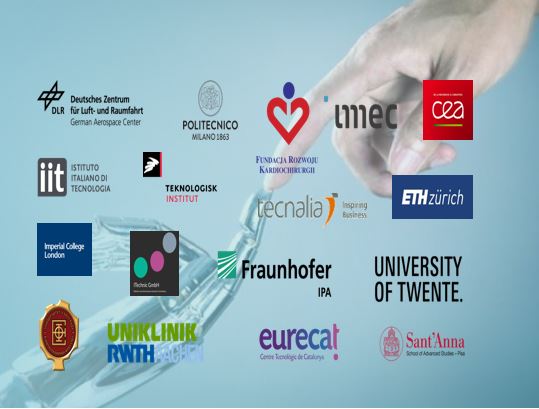
We interviewed Françoise J Siepel, coordinator of DIH-HERO project. Digital Innovation Hub Healthcare Robotics is an independent and sustainable platform for all those who are active in the healthcare ecosystem. Our project started in January 2019 funded by the European Community. Financially supported until December 2022 our mission is to create a sustainable network that connects players in the healthcare sector and supports small and medium-sized enterprises. Our aim is to speed up innovation and reduce time-to-market with a pan-European network.
Can you tell us a bit about yourself and your background?
Being an Assistant Professor/Technical Physician in the field of Robotics in healthcare I joined the Robotics and Mechatronics group at the University of Twente, The Netherlands in 2016. My passion is to innovate and integrate sophisticated robotic and imaging technologies in minimally invasive interventions. On a higher level, I am keen on boosting robotics in healthcare innovation across Europe to establish sustainable, scalable and high-quality robotic solutions. In my role, I am also coordinating DIH-HERO, an initiative to establish an independent platform that connects digital innovation hubs across Europe to create a sustainable network to boost robotics in healthcare. In addition, I am leading the roadmap activities within euRobotics.
Which technology areas will have the biggest impact in the coming years? Why?
I think the following developments in the following technology fields will have the biggest impact in the coming years: intelligent autonomous solutions, multimodality approaches, application-specific actuators, advancement in safety and control with reference to complex human interaction, and cybersecurity. These developments will support the shift from technology push to technology pull to make deployment more effective.
What is the role of DIHs in the accelerating robotics innovations of the EU? How can this role be strengthened?
The role of DIHs is to offer services to all stakeholders within the value chain in developing innovative products for the healthcare market. These services include for example related technology, business capital and incubation, certification and go-to-market, test facilities and test centres, training and education, and connecting stakeholders. Moreover, the regional networks bring extensive expertise in healthcare innovation that boosts activities and alignment on a European level, offers technical/medical expertise, exchange of knowledge through cross border collaboration, understanding of the market and innovation opportunity, standardization and rapid action throughout the value chain if needed.
These roles can be strengthened by building bridges between current initiatives and working on long-term vision and sustainability plans to enable to construction of strong value chains and pillars across Europe.
What are the key elements which robotics Digital Innovation Hubs should use to support the digitalization of their local ecosystems?
One key element is an application-specific one-stop-shop platform including sharing best practices and knowledge.
Which policies should the robotics DIHs pay attention to in the coming years?
In the coming years, the robotic DIHs have to pay attention to standards, best practices, the law, directives and regulations related to quality assurance, safety, environmental care, security, ELSE, CSR, market-led standards, customer-oriented standards, and transparency. A specifically dedicated platform such as DIH-HERO could support guidance.
What are some future funding opportunities for the robotics DIHs?
Examples of future funding opportunities would be the European and national calls related to AI, data and robotics, fees for the exchange of services and expertise and services related to training and education.
Please, name a few challenges and opportunities for robotics DIHs in Europe?
In my opinion, the challenges include overcoming the hurdles to going to market, the context which is not aligned f.e. related to the legislation, and avoiding fragmentation through extensive growth. On the other hand, the opportunities are a large variety of healthcare-related applications, causing societal, economic and clinical impact, enabling fast coordinated actions via the network bringing innovation to the market.
What are the biggest challenges that your SMEs have (including COVID-19) and how do you help them to address them?
The biggest challenges are the discontinuation of projects during COVID-19 in clinical settings and facing other unexpected events, new regulations are coming up, the high cost of robotic solutions, and barriers to bringing a new idea to the market. DIH-HERO supports innovation coaching and gives the advice to coordinate aligned actions, as well as financial support via FSTP actions. In addition, we exchange knowledge and share best practices in a coordinated way.
How do you support SMEs and your industry in general in the fight against COVID-19?
Our organization supports SMEs by giving extra support via calls. In this regard, DIH-HERO launched the COVID-19 support call in direct reaction to the pandemic. Moreover, we provide SME specifically tailored support and offer an overview of the clinical landscape.
Find out more about DIH-HERO here and on their social media platforms.
